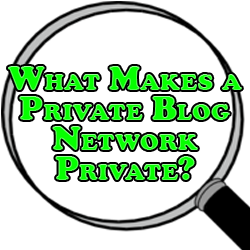Last year we saw one of the biggest supposedly private blog networks, Build My Rank, go down. The reason it went down with a bullet courtesy of Google was simply because, A: it was abused, and B: it wasn’t private. Let’s talk about what makes a private blog network private.
What Makes a Private Blog Network Private?
Abuse aside, it wasn’t difficult for employees with Google to purchase some links or even hundreds or thousands of links to get a very quick idea of the signatures of sites involved in their network. And keep in mind that this is without even having to go into their thousands of resources which they can use to identify a linking profile.
The fallout was quickly felt across most sites which were receiving previously powerful link juice from those sites on the network: they lost their rankings overnight. With those rankings many webmasters lost their incomes and possibly their livelihood and way of life all because they put too much faith and reliance on links from one paid linking service, never a good idea and evermore evidence for link diversity which doesn’t just mean numbers of links from a multiple websites but it means types of sites and services those links come from, as well, and varying them as much as possible.
Still, private blog networks continue to work so long as you adhere to a few rules, least of all that your private blog network is truly private. So this begs the question and topic of this post, what makes a private blog network private?
IP: Having two or more of your sites hosted at the same IP address is a giveaway that they are connected. Exchanging links between the two won’t have nearly the same effect as if they existed on separate IPs. This means that you need to have multiple hosting accounts, ideally one for each of your sites within the private blog network and even more ideally with different hosts as different hosts will guarantee that you have variety in every class of the IP signature.
WHOIS: Private domain registration typically comes at a cost unless you’re using a service like NameCheap to register which gives you at least one year of private domain registration free of charge. What is private domain registration? This simply means that no one will know that you are the owner of a particular website which you have the private registration linked to. Otherwise website ownership information is freely accessible and available on sites which provide an open database of who is hosting which sites.
This not only exposes your personal contact information which you linked to your site when you registered to anyone who cares to look it up, but it also means that Google and anyone else knows that you own the rights to that site. If you aren’t using private registration (which can be added after registration at any point at a cost through your registrar), Google can see that you own whichever multiple sites are included in your blog network. Not a good thing and this can actually have an adverse effect on the influence and link juice your sites will pass to one another when it’s exposed.
Sole Ownership: A private blog network is only truly private if only one person owns the content in that network. Once multiple people become involved, it can become compromised. Thousands of webmasters were receiving links from Build My Rank, so the owners of that service and those sites didn’t truly own their own content which was a large part of their downfall. Never sell links from your sites (as tempting as it may be) to ensure your network remains private until you say otherwise.
Be Smart: Just because you own all of the sites in the private blog network doesn’t mean that you can abuse it and just start sharing hundreds of links between the sites. Be conservative and maintain your composure and discipline and remember that less is more when you’re linking. Too many links dilutes their effect. This is true and never changes no matter what kind of sites you’re dealing with, private blog network or not.
In the same vein as being smart, also make sure you’re not linking between irrelevant sites that you own. Also make sure to not go overboard with over optimization. Just because you control the content doesn’t mean that the latest Penguin rules don’t apply to you. The links will be worth more, but don’t abuse it.
Follow these basic guidelines and ensure that your private blog network remains that way and consequently remains as rewarding as possible.
